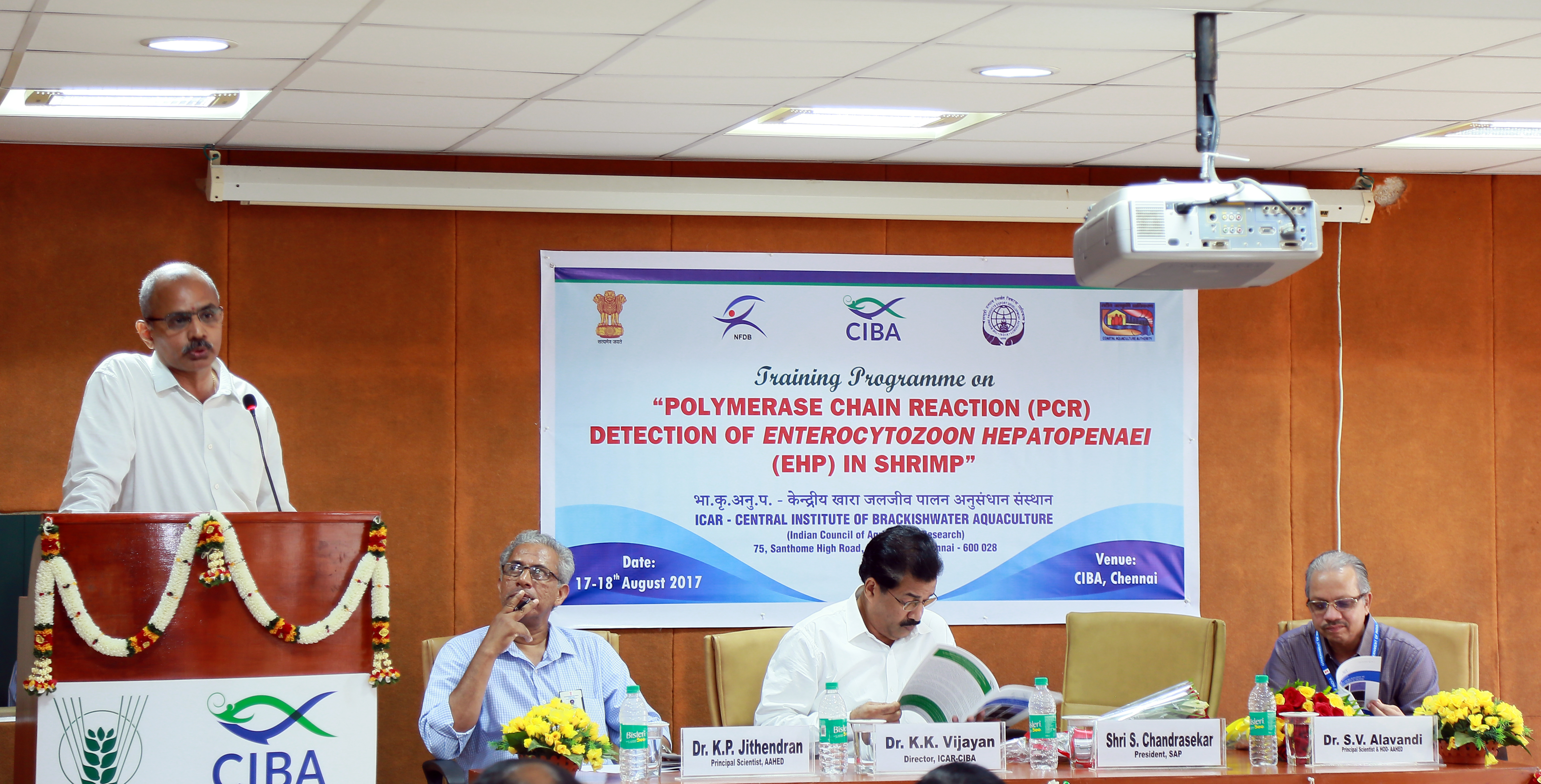The high value shrimp aquaculture industry in India is recently being affected by the emergence of a growth retardation problem caused by a microsporidian parasite, Enterocytozoon hepatopenaei or EHP. This problem goes unnoticed for quite some times during the culture practice as no clinical signs or significant mortality is being associated with. Combined effect of growth retardation and increase food conversion ratio (FCR) force the farmers to bear huge economic loss. Through the surveillance programme, ICAR-CIBA reported the presence of this parasite in the country, for the first time. Subsequently the incidence in the farms showed an increasing trend, and more recently, CIBA detected this parasite from the post larvae procured from some of the hatcheries, and even from one of the imported artemia consignments, thus flagging an alarming situation.
This situation warranted an urgent need for screening of larval samples from the hatcheries and also the artemia for the parasite, EHP, using a specific and sensitive diagnostics. In order and to facilitate this process, CIBA conducted hands on training programme on “Polymerase Chain Reaction (PCR) detection of Enterocytozoon hepatopenaei (EHP) in shrimp” for the hatchery personnel, overseeing the quality and diagnostic laboratory. This training programme was organised in collaboration with Coastal Aquaculture Authority of India (CAA) and Marine Products Export Development Authority of India (MPEDA) during 17th and 18th of August 2017. Fourteen representatives from private shrimp hatcheries, colleges and Government laboratories involved in the shrimp larval quality and also providing aquaculture services participated in this training programme.
Mr. S. Chandrasekar, Presedent, Society of Aquaculture Professionals (SAP), Chennai, who inaugurated the training, expressed his concern about the grim scenario emerging in the shrimp culture industry in India, especially with new pathogens and related crop failures. He invited the Indian stake holders to adhere to scientific management practices and learn lesions from other countries in increasing the productivity. He lauded the timely effort taken by CIBA in organising the training programme and was hopeful that it will help to screen for EHP in the stock and supply disease free larvae to farmers. Appreciating the earlier effort taken by ICAR-CIBA in rejecting the rumour of early mortality syndrome presence in India, he felt happy with the current disease surveillance programme taken up by the institute. He further suggested including EHP in the harmonisation programme and increasing awareness among the farmers regarding different disease problems including EHP.
Dr. Anup Mandal, representative from MPEDA, Dr. S.V. Alavandi, Principal Scientist & Head and Dr. K.P Jithendran, Principal Scientist of Aquatic Animal Health and Environment division of ICAR-CIBA also provided knowledge regarding EHP infection and its prevalence in shrimp aquaculture industry of India. In his presidential address Director of CIBA & Member Secretary, CAA, Dr. K.K.Vijayan mentioned the dynamics of ever-growing Indian shrimp aquaculture, while emphasizing the responsibility of the industry to keep the quality of the prime inputs such as seed, and also the sustainable and healthy farm rearing. He promised the proactive initiatives of CIBA as a National Referral Laboratory, enabling the technical capability of private entrepreneurs, in important areas such as disease diagnostics and screening, through training and technology backstopping.
During the valedictory programme, Dr. A.K.Panda, Project Manager of Aquatic Quarantine Facility (AQF) of MPEDA, described the role of AQF and stressed on stringent screening of both brood stock and larvae for EHP. He appreciated the effort taken by CIBA in training the hatchery personnel and was hopeful about the strong implementation of EHP screening process of larvae by shrimp hatcheries. All the participants who completed the hand on training on PCR Screening of EHP, received certificates.
[Best_Wordpress_Gallery id=”24″ gal_title=”Sensitization Training programme 17 Aug 17″]
